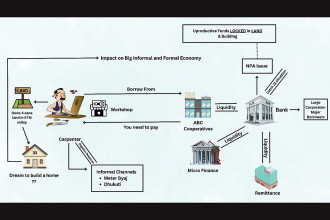
In Nepal, negligence in consumer protection is a pressing issue, along with the weak legal framework. The Constitution of Nepal, through Article 44, consists of consumer rights as a fundamental right, ensuring access to quality goods and services and the right to compensation if these rights are violated. However, the enforcement of these rights often falls short, with widespread unfair practices in the market creating a stark contrast between the legal promises and the reality faced by consumers. Although the Parliament of Nepal promised the establishment of consumer courts, which is intended to address grievances and deliver swift justice, the process has been in development for years without any real progress.
The Department of Commerce, Supplies and Consumer Protection recently imposed fines on 204 firms for violations of the Consumer Protection Act, 2019. The Act stipulates penalties ranging from Rs 200,000 to Rs 300,000 for offences such as tampering with product quality, creating artificial scarcity, or mis-labelling goods. But, the Act’s framework raises concerns about victim compensation. In cases where negligence has led to fatalities, severe injuries or long-term disabilities, and where some corporations continue to operate without significant repercussions, one must question whether the current penalties and legal measures are adequate.
I will outline three cases of the very many that occur on a regular basis to illustrate my point.
The first case is the electrocution incident in September 2023 of a guest in a hotel swimming pool. The victim remains in coma eleven months later, with minimal signs of recovery. The hotel’s negligence in maintaining proper electrical safety is a glaring fact but the victim’s family is still seeking legal justice.
In a very recent tragic aviation incident, eighteen people were left dead with one sole survivor, the pilot who is currently undergoing treatment for serious injuries. The flight was supposed to be a maintenance ferry, carrying only the pilot and essential technical staff. However, a significant number of unrelated individuals were on board, raising serious concerns about regulatory oversight and breach of safety protocols.
From date expired products to adulterated food and water there have been multiple cases reported over the years, endangering consumer health. The blatant disregard of food safety standards highlights major failures in business practices and regulatory oversight.
The cases mentioned here are some examples of ‘they knew and failed to’. There are, unfortunately, many more cases.
Nepal needs to implement several key reforms to enhance disaster management and corporate responsibility. Amending existing laws to address corporate negligence more effectively is crucial, as current penalties and regulations are inadequate. The Companies Act should be updated to enforce stricter punishments and clearer safety standards, with regulatory bodies proactively enforcing disaster management guidelines. Additionally, the judicial process for corporate disaster cases must be expedited, with stronger penalties and measures to fast-track urgent cases and incentivise judges to resolve them promptly.
Promoting a culture of risk prevention within industries is essential. Industry leadership should actively support safety standards, conduct regular seminars and communicate policies effectively.





-1758271497.jpg)
